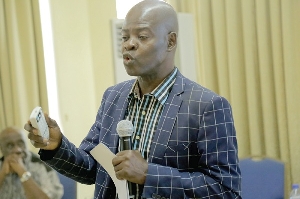 Co-Chair of Ghana Extractive Industry Transparency Initiative, Dr Steve Manteaw
Co-Chair of Ghana Extractive Industry Transparency Initiative, Dr Steve Manteaw
Dr Steve Manteaw, Co-Chair of Ghana Extractive Industry Transparency Initiative (GHEITI), has advised policy makers to desist from using the country's natural resource revenues to finance recurrent expenditures.
He said they should channel these revenues into investments and use the returns on it to finance their social interventions if they want to.
Dr Manteaw gave the advice in Tarkwa when the Ghana Chamber of Mines organised the mining for development forum on the theme "Leveraging the presence of a Mine for sustainable development".
He stated that "Our mineral revenues as income for consumption, as against treating them as income for investments, there is a way in which you are able to ensure the sustainability of the social programme."
"So, for instance, if we take the free Senior High School, a third of the programme is being financed from oil revenues, whereas $30 million of the same revenue has been invested into the Kotoka Terminal Three. Over the period, this investment has generated returns to a tune of about 10 million dollars," he said.
"Now, if you are undertaking any social intervention, such as free SHS, you are able to code the $10 million returns on the investment to support the programme, while the $30 million remains invested, and therefore, you are able into the longer future to finance the social intervention," Dr Manteaw explained.
Sulemanu Koney, Chief Executive Officer of GCM, in his welcoming address, said in the value chain, principally the manufacturing and fabrication of real inputs into the mining industry, was something they have been pushing hard on.
"One of the things the Chamber have done is to work with the Ghana Standards Authority to establish standards in practically everything which goes into the mining industry," he said.
He revealed that they have done some work around electrical cables and were about to do something similar for grinding media, just to make sure that whatever was produced by local manufacturers met the needs and the quality standards that the mining industry required.
"Therefore, it is our view that we should get a lot more manufacturing terms coming to work with the GCM so that they can produce the various inputs that we cannot produce locally for the industry; this is a way to create value and retain the value of the mining industry within the country," he added.
In addition, Mr Koney said the move should help industrial and manufacturing growth, create massive employment as well as general economic value added within the country, adding, "So we believe just by doing that on the back of the mining industry, we can create so much value for our country".
Mr Evans Agbenyegah, Deputy Stool Lands Officer for Western Region said, they have realised that most of the assemblies did not use the monies they provide them for sustainable physical development.
He, therefore, entreated the various assemblies within the region to start using the revenues from the office of the administrator of stool lands for legacy projects and label them as such.
According to Mr Agbenyegah, "the assemblies should not name the projects as Mineral Development Fund (MDF) because the funds come from the office of the administrator of stool lands. It is not just mineral royalties that come to us; we receive concession, ground, and farm rents, and we put all these monies together, which constitute the 55% that we give the assemblies for physical development projects."
The engagement brought together government authorities, traditional leaders, civil society organisations, representatives from the mining sector and media to explore collaborative strategies for maximising the benefits of mining activities for sustainable development.
Click here to follow the GhanaWeb Business WhatsApp channel